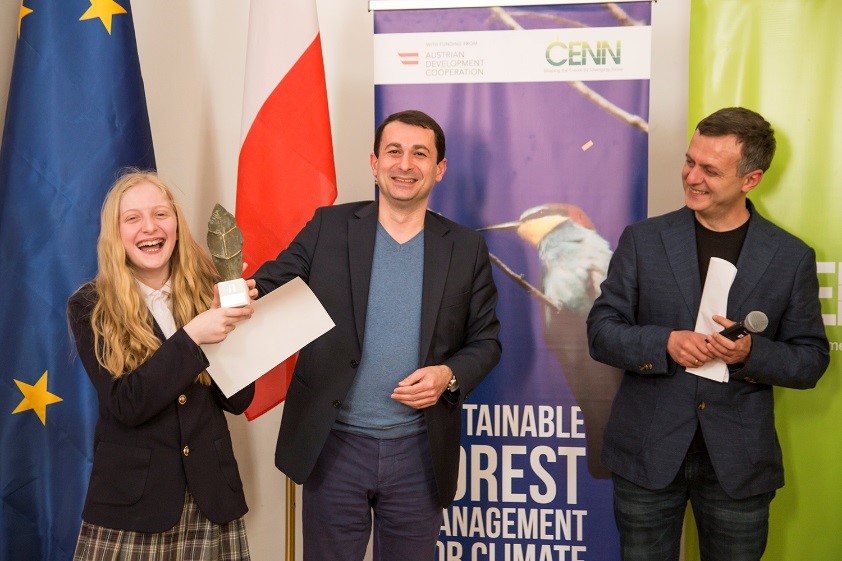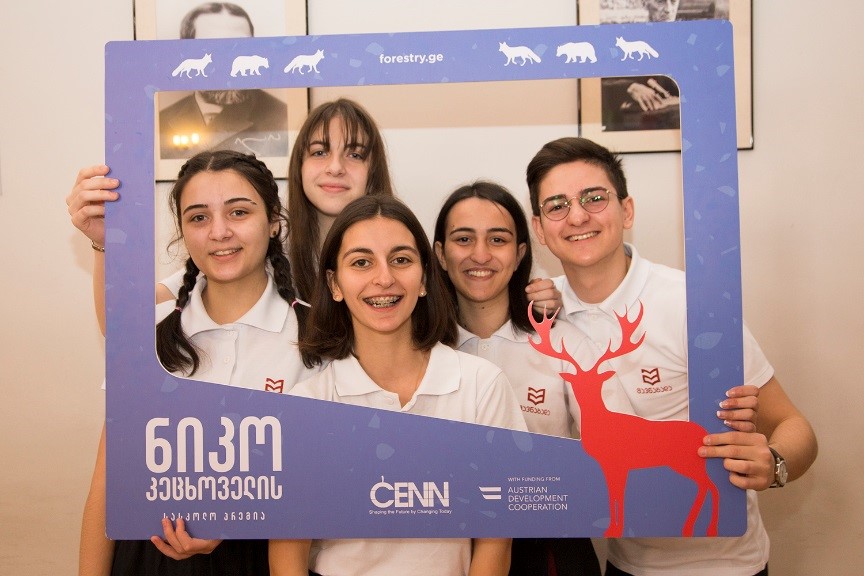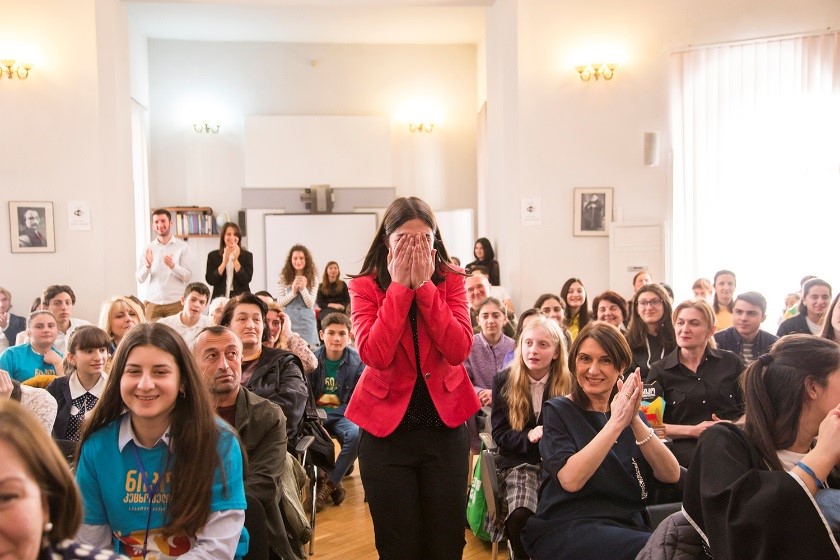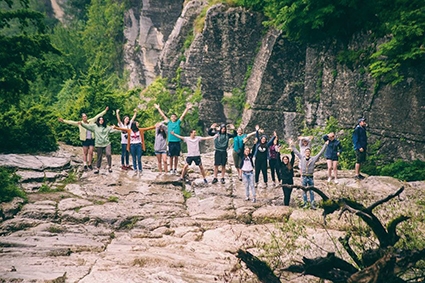Schools Taking Responsibility for Sustainable Environmental Protection
This May, the Niko Ketskhoveli Award 2020 – Partnership for SDGs is set to kick off, with old-hands and beginners ready to register on forestry.ge to compete.
The aim of the Niko Ketskhoveli School Award is to encourage schools to make changes in the communities in which they live. With information shared country-wide through announcements, teacher meetings and posters, schools everywhere from towns to the remotest mountain villages have the chance to show that they want to instigate change. The initiative comes hand-in-hand with civic education, which informs and empowers pupils to be courageous and demand more from the authorities and adults in their communities after identifying problems needing to be solved in their environs. The Niko Ketskhoveli School Award has a focus on the environment and sees school ‘eco-club’ members uniting with their schoolmates, families, neighbors and local authorities to reduce resource consumption, implement waste management projects and clean and protect the environment.
The final event of the Niko Ketskhoveli School Award 2019, was held on March 21, the International Day of Forests. The focus of the contest was the UN Sustainable Development Goals (SDGs). Around 500 schools participated, with 150 schools identified during the semi-finals in regional centers. 32 finalists were chosen to present their year’s-worth of environmental projects to a jury comprised of representatives of governmental, international and research bodies. Members of the teams of the three winning schools- the Rokiti Public School (Baghdati) in first place, followed by the St. Aleksi Shushania Orthodox School-Gymnasium (Senaki) and Georgian School (Tbilisi) - will attend a 10-day ‘Eco-Camp’ followed by a five-day study program ‘Young Ranger’ within the Protected Areas of Georgia. The National Forestry Agency of Georgia has shown huge ongoing support to the Award, very much enthused by empowering youth to make a real difference in their communities. This year, it is organizing a study tour in the Borjomi Gorge, as part of which the children will also work their green fingers helping to reforest areas affected by fires.
The Niko Ketskhoveli School Award has been organized by CENN since 2015 funded by the Austrian Development Agency (ADA) with funds of Austrian Development Cooperation. Partners include the Ministry of Environment Protection and Agriculture, the Ministry of Education, Science, Culture and Sports and the Parliament of Georgia.
“I have been participating in the project as the member of the jury, as well as a representative of the Ministry [of Environment Protection and Agriculture], supporting the initiative for five years,” said Karlo Amirgulashvil. “This is one of the most successful and significant processes for us, as well as the entire region, bringing together hundreds of schools who put a lot of effort into protecting the environment. It was very difficult to choose a winner as we saw so many wonderful works from students of different educational establishments. We at the Ministry pay a lot of attention to this new generation, with its more progressive global outlook, so vital for the development of the country. Increasing public awareness with their help is paramount.”

So, how does it work? A representative of a school’s eco-club, which is made up of a maximum of 10 members including a teacher, registers on forestry.ge where they can find a list of possible project activities, each of which is allocated points. Themes encompass natural resources protection, water and sanitation, climate change and responsible consumption, amongst other SDGs. A clean-up campaign, for example, will get the school 100 points; development of an action plan for the “Eco Club” linked to the SDGs is also worth 100 points. If an Eco-Club chooses to create a campaign, writes a project, finds a donor, gets funding and implements it, they get the highest points available. A moderator of the award portal – forestry.ge oversees and evaluates this process, checking that the criteria is being fulfilled- photos provided, a detailed agenda made. If something is missing, s/he will give feedback via the electronic platform.
The semi-finals are the organizers’ chance to personally communicate with the Eco-Clubs and find out more about the successes of their projects and to give feedback. The jury is made up of the heads of department of the ministries of Education and Environment, representatives of national organizations, such as the National Forestry Agency (NFA), and others who work in the field of environment, such as Ilia State University and Tbilisi Zoo, National Geographic Georgia, etc.
Pupils need to demonstrate to the jury that they understand the impact their project had and be able to answer questions well and explain what the club, as individuals, and the community gained from the implemented projects.

The Rokiti school Eco-Club was greatly aided by the public speaking skills of Nana Labadze, the leader of the team, and, indeed, presentation is very much a part of what makes a winning team in the Ketskhoveli Award. Labadze impressed the Ministry of Environment Protection and Agriculture so much that they awarded her the opportunity to become their Minister for a day!
“The Niko Ketskhoveli School Award motivated me to get more actively involved in environmental protection,” Labadze told GEORGIA TODAY. “Most importantly, it helped me to see how vital it is that youth be involved in such projects. It was also very exciting to see the positive outcomes of my efforts and contribute to changing my community.”
So, what are some of the things the Rokiti Public School eco-club did to win? We contacted them to find out more.
• Held informative meetings in five communities focusing on forest preservation. As a result, attitudes were changed and the territory adjacent to the river Khanitskhali was replanted with trees.
• Held 45 different meeting-seminars in five villages of the region of Baghdati with a focus on healthy lifestyle and gender and ecological issues.
• Within the scope of the project ‘Safety of Labor and Environmental Protection’ of the Akaki Tsereteli State University, received equipment worth 8,000 GEL, used to carry out experiments and run diagnostics.
• Got additional rubbish bins placed throughout the village.
• Made recycling paper a tradition.
• Got villagers to stop burning their leaves and compost them instead.
• Cleaning-and-greening campaigns; working with the National Forest Agency, planting 20 fraxinus and 50 pine trees.
• Prepared a video ‘Animal Protection is Our Duty’.
And if that’s not enough inspiration for you, the runners-up at the St. Aleksi Shushania Orthodox School-Gymnasium encouraged their community to clean up green areas, cycle rather than drive, protect and feed street dogs, help the poor and disabled of society, and worked with other schools to develop environmental and sporting activities.
“This was the first time our school took part in the Niko Ketshkoveli School Award,” Natia Davitaia of St Akeksi Shushania told us. “The children’s interest increased by the day, and they began suggesting their own initiatives, including planting trees and cleaning recreational areas. The excitement of children was so high and natural that we didn’t even feel we were part of a competition! The Award is vital for increasing the awareness of adolescents of the significance of environmental protection, as well as for improving their skills and contributing to their formation as developed individuals with high principles and values”.
The Georgian School, amongst other things, launched classes on sustainable development, which they shared with other schools in the region- even getting some diplomats involved in spreading the word, and encouraged a number of celebrities to promote their (now national!) ‘No to Tobacco’ campaign.
CENN and its partners develop pupils’ skills of presenting, and give a solid education in environmental issues and how to solve them, at the Eco Camps. The special training sessions are organised for active teachers as well.
We also spoke to Gerhard Schaumberger - Head of the South Caucasus Office of the Austrian Development Agency, representative of the financial donor. “Protection of the environment is among the key priorities of the ADC worldwide. In Georgia, a country so similar to Austria, this refreshing initiative has already inspired so many young people to see the beauty of nature and climate as something rich and valuable to preserve and be connected with. Today, the initiatives of young people wanting to stop climate change around the world confirm that we have invested well, while unfortunately challenges of biodiversity and climate change have even gotten bigger.”

“We believe the main benefits of the Niko Ketskhoveli Award are the knowledge, innovations and self-expression provided for students and their teachers,” Nana Janashia. Head of CENN said. “We empower future leaders who value the environment and have ideas for diversified rural development. Young people believe that global change is necessary and it starts from local level, so by investing in future leaders, we ensure the sustainable development of future communities.”
We asked if any of the school campaigns had resulted in institutional and legislative changes and were given the example of a local school which demanded the Krtsanisi Park between Tbilisi and Rustavi be given protected status. The school’s Eco-Club representative sat in on meetings with official bodies and participated in discussions. In the same vein, an Eco-Club in Gori Public school no 1 demanded Ateni Valley be protected and raised public support through a petition.
We are excited to see the results of the Niko Ketskhoveli Award 2020 just opening from this May.
About CENN
CENN is a non-governmental organization working to protect our environment by fostering sustainable development throughout the South Caucasus. CENN specializes in a number of areas including combating climate change, sustainable resource management, waste management, building and developing healthy and prosperous climate-resilient communities, and empowering women and youth to create innovative and inclusive solutions.
You can see for yourself how active a single Eco-Club in a school anywhere in Georgia can be when its pupils are educated and motivated to make a real difference to their lives and communities.
Want to do the same? Register on forestry.ge from May, 2019. Still not sure? Here are 10 Reasons to Join the Niko Ketskhoveli School Award:
1. Get to present yourself, your knowledge and skills
2. Become a volunteer
3. Take care of your village
4. Get inspired
5. Become part of ongoing global processes
6. Set goals
7. Become a source of inspiration for others
8. Become a leader
9. Make new friends at the eco-camp
10. Protect the environment!
By Katie Ruth Davies












